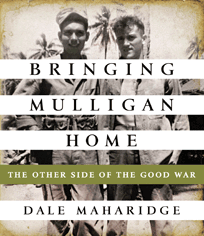 What is the true cost of war? How do we measure it? What are we really asking of the young men and women we send into combat? And if we can actually bring ourselves to answer that last question honestly in all its most horrifying specifics, what are the implications for the future lives of those who survive the ordeal?
What is the true cost of war? How do we measure it? What are we really asking of the young men and women we send into combat? And if we can actually bring ourselves to answer that last question honestly in all its most horrifying specifics, what are the implications for the future lives of those who survive the ordeal?
In Bringing Mulligan Home: The Other Side of the Good War (narrated by Pete Larkin), Pulitzer-Prize-winning journalist Dale Maharidge delves into those most difficult questions in a ten-year quest that is one part relentless journalistic investigation and one part ferocious filial obsession. His search: to finally understand his late father; to fathom the discrepancy between the hopeful young man he once was and the brooding, volatile, heavy-drinking loner who returned from the Pacific theater of World War II.
Steve Maharidge rarely talked about the war, and only once, while under medication, did he refer to a photo taken on Guadalcanal of himself and another Marine, a photo he always kept displayed in his metal shop. That one time, in a drug-addled ramble, he suggested that he had been blamed for the other man’s death on Okinawa. “But it wasn’t my fault,” he insisted. “It wasn’t my fault.” After his father’s death, Dale found a name written on the back of the photo: Herman Walter Mulligan.
With a name to attach to mystery man in the picture, Dale began to search for what had happened to Herman Mulligan and, by extension, to his father in the battles of Guam and Okinawa. He filed a Freedom of Information Act request and discovered Mulligan was killed in action on May 30, 1945 and that his body was never recovered. He tracked down the few living members of L Company who would have known Mulligan and his father, and travelled to interview them. These men, all in their eighties and nineties, were finally opening up about their experiences in the war. For one of them, the younger Maharidge was the first person he’d ever told about what he’d seen and done on those faraway islands so long ago. The horrors these men saw and participated in, including unspeakable acts committed by one member the company and witnessed by another, had been kept inside them for all those decades, casting shadows and driving them in ways unknown.
Maharidge also went to Okinawa to see the actual sites where his father fought in order to better understand the battles and to search for the final resting place of Herman Mulligan. He learned about the permanent damage of concussive brain injuries caused by proximity to bomb blasts, a condition from which his father almost certainly suffered. Among his father’s things, Dale had found the passport, wallet and other effects of a Japanese soldier that his father had taken. Dale was able to track down the family of the man to return the possessions.
The silence of the men of L Company was and is typical of war veterans. In our culture, we are loathe to address the actual realities of war—we don’t want to hear it. I’ve often wondered about the American custom of automatically designating all who spend time in military service as de facto heroes. Certainly it takes great courage to risk one’s life day after day, and if done so honorably in the ministration of a cause one believes in and for the sake of others, it is unquestionably a heroic enterprise. But I’ve long suspected that this hero-designation is not just a convenient way we’ve devised to honor military service. I wonder if it’s not also a way for us as a society to insulate ourselves from the devastating nature of what we ask them to face in war. We send these soldiers, these people, to do the things we not only don’t want to do ourselves but don’t even want to think about. Do we call them heroes so we can pretend they’re larger than life, in possession of an extra-human invulnerability that shields them from the atrocity and trauma they experience—the things they must do, and see, and that are done to them—in a combat zone? Is that how we can ask this of our children generation after generation and still live with ourselves?
Bringing Mulligan Home lays bare the truth that soldiers, however brave and self-sacrificing, are not superheroes. They are human beings—people—and as such, vulnerable. War is hell on earth, destruction and mayhem on a massive scale. But it is also a devastation at the most personal level. Not only is the flesh highly susceptible to grave injury and extended suffering, so are the mind and heart and soul. These are hard truths we must obligate ourselves to address with a pervasive and ruthless honesty before we ever send our sons and daughters off to war, and for as long as they live after coming home.

It’s an amazing book. And I would add that the emotional cost the soldiers pay is also born by their families for the rest of their lives.